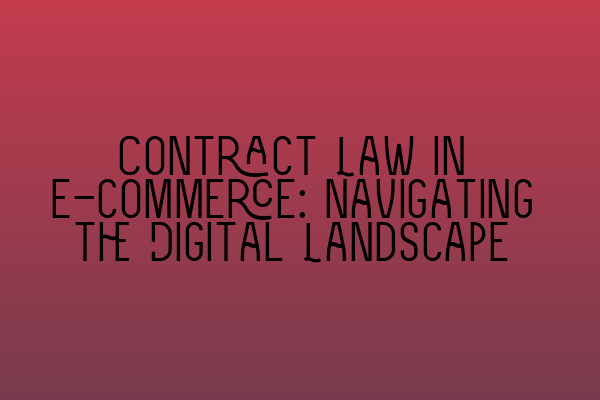Contract Law in E-commerce: Navigating the Digital Landscape
Welcome to SQE Contract Law, where we are dedicated to providing you with the latest insights and information on contract law in the digital age. In today’s blog post, we will be exploring the intricacies of contract law within the realm of e-commerce and how businesses can effectively navigate the ever-changing digital landscape. Whether you are a solicitor, business owner, or simply interested in contract law, this article is a must-read.
Understanding Contract Law in E-commerce
E-commerce has revolutionized the way businesses operate, allowing for seamless online transactions and global reach. However, with this increased convenience and global reach comes a whole new set of legal considerations. Contract law is the foundation upon which these online transactions are built, ensuring that parties involved have a clear understanding of their rights and obligations.
When engaging in e-commerce, it is important to have a solid understanding of the key principles of contract law. This includes offer and acceptance, consideration, intention to create legal relations, and certainty of terms. By familiarizing yourself with these concepts, you can ensure that your online business transactions are legally valid and enforceable.
In addition to understanding the key principles of contract law, it is also essential to be aware of the legal frameworks that govern e-commerce. These frameworks may vary depending on the jurisdiction in which the business operates. For example, in the United Kingdom, e-commerce activities are regulated by the Consumer Contracts (Information, Cancellation, and Additional Charges) Regulations 2013 and the Electronic Commerce (EC Directive) Regulations 2002.
Navigating the Digital Landscape
In order to effectively navigate the digital landscape, businesses need to adopt proactive strategies that address the unique challenges posed by e-commerce. Here are some key considerations:
1. Clear and Concise Terms and Conditions:
One of the most important aspects of e-commerce is the establishment of clear and concise terms and conditions. These terms and conditions should outline the rights and responsibilities of both the business and the customer, including details regarding payment, delivery, returns, and dispute resolution. By having well-drafted terms and conditions, businesses can minimize the risk of contractual disputes and protect their interests.
2. Incorporating Clickwrap Agreements:
Clickwrap agreements, also known as “click-through agreements” or “click-to-accept,” are commonly used in e-commerce to obtain the customer’s consent to the terms and conditions. These agreements typically require the customer to click a checkbox or button indicating their acceptance. By incorporating clickwrap agreements, businesses can ensure that customers are aware of and agree to the terms before proceeding with the transaction.
3. Privacy and Data Protection:
With the increasing amount of personal data being collected and processed online, businesses must prioritize privacy and data protection. Compliance with data protection laws, such as the General Data Protection Regulation (GDPR) in the European Union, is crucial to maintaining customer trust and avoiding legal repercussions. It is essential to have clear privacy policies in place and obtain appropriate consents from customers for the collection and use of their personal information.
4. Electronic Signatures:
Electronic signatures are becoming increasingly common in e-commerce transactions. They provide a convenient and efficient way for parties to indicate their intent to be bound by the terms of a contract. However, it is important to ensure that the electronic signature meets legal requirements and is reliable and secure. By implementing electronic signatures, businesses can streamline the contract formation process and reduce the need for paper documents.
Conclusion
As e-commerce continues to thrive, it is essential for businesses to navigate the digital landscape with a solid understanding of contract law principles. By incorporating clear terms and conditions, clickwrap agreements, privacy and data protection measures, and electronic signatures, businesses can mitigate legal risks and ensure the enforceability of their online contracts. At SQE Contract Law, we are committed to helping you stay informed and up-to-date with the latest developments in contract law. For more information on contract law and exam preparation, check out our related articles:
- SQE 1 Practice Exam Questions
- SQE 1 Practice Mocks FLK1 FLK2
- SQE 2 Preparation Courses
- SQE 1 Preparation Courses
- SRA SQE Exam Dates
Thank you for reading, and stay tuned for more informative articles on contract law.
